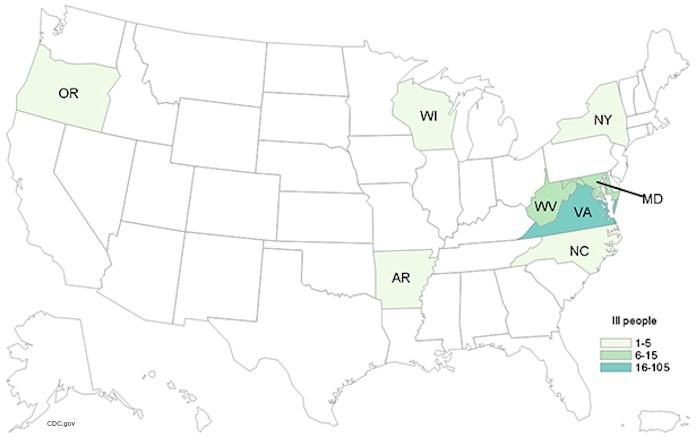The hepatitis A outbreak linked to frozen strawberries imported from Egypt and served in Tropical Smoothie Cafe products has slowed down, according to the Centers for Disease Control and Prevention. The press release says, “information at this time does not indicate an ongoing risk of acquiring hepatitis A virus infection at Tropical Smoothie Cafes, as the contaminated food product has been removed as of August 8, 2016.”

But there may still be people diagnosed with infections from those products. Symptoms of hepatitis A can take as long as 50 days to appear. That means that someone sickened on August 8, 2016 could start feeling sick September 27, 2016. That person then has to go to the doctor and be diagnosed before they would be included in the outbreak case count.
The CDC’s numbers in this outbreak as of September 29, 2016 include 131 sick. Virginia, where the outbreak was centered, said that as of 12:00 pm on October 3, 2016, there were 106 Virginia residents sickened in this outbreak. That means there are 132 people sickened so far.
The case count by state is: Arkansas (1), Maryland (12), New York (3), North Carolina (1), Oregon (1), Virginia (105) [106 according to the Virginia DOH], West Virginia (7), and Wisconsin (1). Fifty-two ill persons have been hospitalized, for a hospitalization rate of 39.7%, which is about twice the typical rate for this type of outbreak. No deaths have been reported.
Epidemiologic and traceback evidence indicates that frozen strawberries imported from Egypt are the likely source of this outbreak. Almost all of those interviewed reported drinking smoothies containing strawberries at Tropical Smooth locations before August 8, 2016 in Maryland, North Carolina, Virginia, and West Virginia.
Secondary infections caused by ill persons could continue to be diagnosed for months. People who are infected with the hepatitis A virus are infectious for two weeks before symptoms appear, so they would continue to work and prepare food for others before they even know they are sick.
Hepatitis A outbreaks are common and can quickly grow, since the virus is so contagious. The virus is easily spread person-to-person, and through contaminated food and drink. Anyone sickened with this virus should stay home and not prepare food or drink for others. The best way to prevent the spread of this illness is to wash your hands thoroughly after using the bathroom, since it is passed on through the fecal-oral route.
If you think you have gotten sick from drinking a smoothie made from frozen strawberries at Tropical Smoothie Cafes before August 8, 2016, see your doctor. It’s too late for hepatitis A or immune globulin vaccinations for those who may have been exposed and have not been previously vaccinated. Monitor yourself for the symptoms of hepatitis A if you have consumed those smoothies or have been in contact with someone who has gotten sick.
The symptoms of hepatitis A include jaundice (yellowing of the eyes and skin), dark urine, clay-colored stools, abdominal cramps, fever, fatigue, weight loss, loss of appetite, and muscle aches. People who contract this infection can be ill for weeks or months.
Hepatitis A can be a serious disease that can affect the liver. The elderly, those with liver disease,and people with compromised immune systems are more likely to suffer serious complications from this illness.
The CDC says that they are not aware of any other restaurants that may have received the frozen strawberries from Egypt. If this information changes, the CDC will inform the public immediately.




